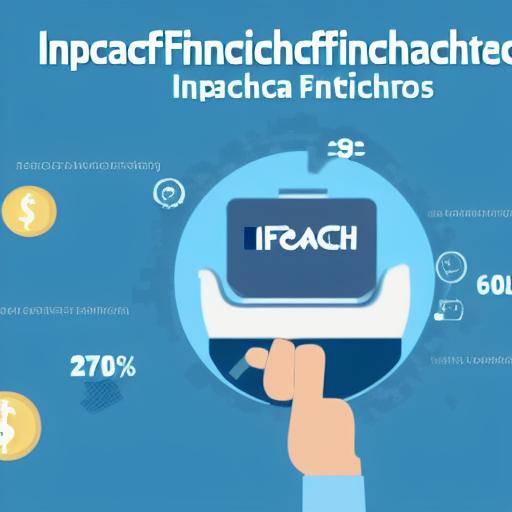
Electronic commerce has experienced exponential growth in recent years, transforming the way transactions are carried out. The application of technology has been fundamental to this revolution, and the development of new financial solutions, known as Fintech, has played a crucial role in facilitating and optimizing these operations. In this article, we will explore how transactions, technology and efficiency are intertwined in the context of e-commerce, and how Fintech solutions have helped boost this growth. From its emergence to future trends, we will analyze in depth how these innovations are shaping the future of electronic commerce.
Introduction
Electronic commerce has experienced an unstoppable boom, transforming the way companies and consumers conduct their transactions. Technology has been the cornerstone of this transformation, playing a crucial role in the optimization and efficiency of online transactions. In this scenario, Fintech solutions, or financial technologies, have emerged as engines of change, redefining how online transactions are carried out. In this article, we will explore how these innovations are redefining the e-commerce landscape, facilitating safer, efficient and tailored transactions to the demands of a constantly evolving market.
History and Background
The emergence of electronic commerce dates back to the first electronic transactions in the 1970s, when the bases for online financial transactions were laid. However, it was in the 1990s when electronic commerce experienced significant growth, with the expansion of the Internet and the development of security protocols that paved the way for secure online transactions. The arrival of Fintech solutions at that time marked the beginning of a new era in electronic commerce, introducing innovations in electronic payments, financial management and online loans.
Since then, the evolution of technology has continued to drive electronic commerce to new heights, with Fintech solutions playing a crucial role in this journey. The creation of secure payment platforms, the digitization of financial services and the development of mobile applications have contributed significantly to the expansion and adoption of electronic commerce worldwide.
Analysis in Deep
The impact of Fintech solutions on electronic commerce is evident in multiple aspects. From reducing transaction costs to expanding the consumer base, these innovations have triggered a radical transformation in the way online transactions are carried out. Fintech solutions have brought comfort and security to a completely new level, offering consumers and companies a range of tools to manage their finances efficiently and safely.
In addition to the obvious benefits, it is also important to recognize the challenges that have arisen with the expansion of e-commerce and Fintech solutions. Cybersecurity, data protection and regulation are fundamental aspects that require constant attention to ensure the integrity and reliability of online transactions. Adaptation to these challenges has been critical to sustained growth in e-commerce and Fintech solutions.
Comprehensive review
The spectrum of applications of Fintech solutions in electronic commerce is wide and diverse. From efficient payment processing to intelligent supply chain management, these innovations have proven their worth in a variety of scenarios. Electronic trading platforms have increasingly integrated Fintech solutions to provide a complete and uncomplicated experience to its users, opening up new possibilities for companies of all sizes.
The debate on how best to implement these solutions and maximize their efficiency has been the focus of numerous studies and analysis. The comparison between different methods and approaches has revealed interesting perspectives on how Fintech solutions are transforming the e-commerce landscape and redefining trade strategies.
Comparative analysis
By comparing traditional transactions with those enabled by Fintech solutions, the notable difference in efficiency and agility is evident. Fintech-driven transactions offer greater flexibility and speed, allowing companies to adapt quickly to changing market and consumer demands. The integration of technologies such as blockchain and mobile payments has simplified the transaction process and significantly reduced associated costs.
Beyond transaction efficiency, Fintech solutions have also revolutionized customer experience in electronic commerce. The customization of offers, audience segmentation and optimization of the purchasing experience are just some of the areas in which these innovations have marked a significant difference. By understanding consumer behavior at a deeper level, companies can offer customized solutions tailored to individual needs, increasing customer satisfaction and loyalty.
Practical Tips and Accessible Recommendations
For companies looking to maximize Fintech solutions in e-commerce, it is crucial to understand the specific requirements of their business and the challenges they face. In assessing available solutions, it is important to consider not only the efficiency and security of transactions, but also the ability to scale and adapt to future innovations. Collaboration with reliable and proven Fintech solutions providers can be key to ensuring successful integration and a positive impact on the business.
In addition, staff training and training in the effective use of Fintech solutions is critical to maximizing benefits and minimizing risks. As these technologies continue to evolve, keeping track of the latest trends and updates becomes equally relevant. Proactive participation in communities and innovation groups Fintech can provide a valuable insight into best practices and emerging applications in e-commerce.
Industrial Perspectives and Expert Reviews
The impact of Fintech solutions on electronic commerce has been the focus and debate in the business and technological community. Experts agree that these innovations have paved the way for more dynamic, agile and safe electronic commerce. Perspectives on the growing adoption of Fintech solutions highlight the crucial role they will play in the next phase of e-commerce evolution, especially as trends such as artificial intelligence and the internet of things continue to transform business operations.
Future projections on the impact of Fintech solutions suggest a sustained growth scenario, with a renewed emphasis on interoperability, security and adaptation to global market demands. Collaboration between companies, regulators and providers of technological solutions will be essential to ensure a robust and reliable e-commerce ecosystem that supports continuous growth and improved customer experience.
Case Studies and Applications in Real Life
The concrete impact of Fintech solutions on electronic commerce is reflected in many cases of study that highlight the positive transformation they have generated in companies from different sectors. From simplifying payment processes to optimizing financial management, these solutions have demonstrated their value in real-world scenarios. Examples of companies that have successfully adopted Fintech solutions point to the competitive and operational advantages that these technologies offer, consolidating their position as key drivers of modern electronic commerce.
Future Trends and Predictions
In considering future trends in e-commerce enabled by Fintech solutions, it is clear that the pace of innovation and adoption will continue to accelerate. The convergence of emerging technologies such as artificial intelligence, data analysis and cybersecurity promises new borders on the efficiency and customization of online transactions. The growing adoption of global Fintech solutions also signals a shift towards a more inclusive and accessible e-commerce environment, extending the benefits of these innovations to emerging markets and underserved communities.
It is expected that the role of artificial intelligence in fraud detection and improved transaction security will reach new levels of sophistication, providing a solid framework for greater confidence and transparency in electronic commerce. In addition, the continued advance of blockchain technology promises to revolutionize the integrity and efficiency of transaction processes, opening new opportunities for safe collaboration and authentication.
Conclusions and FAQs
The integration of Fintech solutions has been a fundamental driver of the growth and evolution of electronic commerce. From optimizing transactions to improving customer experience, these innovations have redefined the online trading landscape, marking an exciting journey towards a future of fast, safe and efficient transactions.
To further understand the intersection of transactions, technology and efficiencies in the context of e-commerce, some frequent questions are presented below that address key aspects of these interactions.
Frequently asked questions
1. What is the role of blockchain technology in electronic commerce?
Blockchain plays a key role in e-commerce by providing a safe and decentralized record of transactions. This improves confidence between the parties and reduces the risks of fraud, which is essential for electronic commerce.
2. How can Fintech solutions improve efficiency in inventory management in electronic commerce?
Fintech solutions offer advanced financial and inventory management tools that allow real-time visibility of the inventory and optimisation of the supply chain, leading to greater operational efficiency.
3. What are the regulatory challenges facing Fintech solutions in electronic commerce?
Fintech solutions often face regulatory challenges related to consumer protection, data privacy and cybersecurity, which require close collaboration with regulatory agencies.
4. What impact does artificial intelligence have on the customization of customer experience in electronic commerce?
Artificial intelligence allows you to analyze large volumes of data to understand customer behavior and customize the offers and experiences of purchase, which improves customer satisfaction.
5. What is the potential of Fintech solutions to expand financial inclusion in electronic commerce?
Fintech solutions can reduce access barriers to financial services, broadening the financial inclusion of underserved segments and allowing their active participation in electronic commerce.
6. How can companies prepare to integrate Fintech solutions into their electronic commerce operations?
Businesses should perform a detailed analysis of their business needs and look for reliable Fintech partners. Staff training and alignment with technological trends will be critical for successful integration.
In conclusion, the convergence of agile transactions, innovative technology and operational efficiency has made electronic commerce more dynamic and accessible than ever. With the continued advance of Fintech solutions and the widespread adoption of these technologies, the e-commerce horizon promises to continue to expand to new possibilities and opportunities.






















































